The solar hydrogen project is part of Energy Estate’s HydrogenGrowth platform, which the developer is hoping will see a range of green hydrogen opportunities both of small and large scale, as well as across Australia and internationally, come to fruition.
The Hills Educational Foundation, which runs the primary and secondary schools, as well as the golf academy, and a 250 kW solar farm on campus, is also keen to use the hydrogen facility to provide theoretical and practical hands-on learning opportunities for students interested in renewable energy and hydrogen production.
The solar farm, which currently produces between 30,000 kWh and 40,000 kWh of solar electricity monthly, was commissioned in 2017. According to the College’s website, the Hill Solar Farm was initiated to lessen the school’s carbon footprint and “decrease our dependency on the state grid, thereby also reducing our annual power costs.”

Image: Diamond Energy
Now, thanks to international efforts, the Hills Solar Farm is set to be expanded to 2 MW in order to supply solar energy to the hydrogen plant. Korea-based and south-east-Asia-active renewable energy solutions company, Elecseed, along with Korean government-owned Korea Midland Power Company (Komipo), have already invested in the expansion.
“This is a great opportunity to develop the use of hydrogen in South East Queensland in a practical, distributed environment,” said Energy Estate’s Director of Hydrogen, Kevin Peakman. “We are also pleased to support the carbon neutral goals of the College and provide a meaningful, hands-on opportunity to share that knowledge with the College and its students.”

Image: Hills College
The plant will be able to provide the Hills Educational Foundation, Hills Golf Club and other businesses with renewable energy 24/7 and ensure that the school’s campus buses run on hydrogen fuel. In a statement, Energy Estate said the surplus energy would be sold in the market primarily for mobility uses.
“The Foundation has progressed towards a carbon neutral goal by establishing large ground based solar facilities, converting our diesel buses to run on hydrogen resulting in reduced diesel consumption, and are in the process of establishing a green hydrogen production facility and energy storage capacity,” said Joseph Marinov, CEO Hills Educational Foundation. “The multi-faceted project, that also includes potentially supplying oxygen to the adjacent wastewater treatment plant to reduce operational costs, demonstrates how the use of renewable energy to generate hydrogen can advance the hydrogen economy in Australia.”
Elecseed and Komipo, the latter of which provides some 10% of Korea’s generation capacity and has a global portfolio of more than 16 GW in generation assets either in operation or under development, are also behind an ambitious solar PV project in the heart of QLD’s unconventional-gas country. The Kumbarilla Renewable Energy Project (K-REP), based around a 200 MW solar farm in Queensland’s Western Downs, aims to deliver green hydrogen to Korea starting in 2030, following proof of concept achieved by an integrated pilot project, and quickly ramping up to full production for export in subsequent years.
This content is protected by copyright and may not be reused. If you want to cooperate with us and would like to reuse some of our content, please contact: editors@pv-magazine.com.









By submitting this form you agree to pv magazine using your data for the purposes of publishing your comment.
Your personal data will only be disclosed or otherwise transmitted to third parties for the purposes of spam filtering or if this is necessary for technical maintenance of the website. Any other transfer to third parties will not take place unless this is justified on the basis of applicable data protection regulations or if pv magazine is legally obliged to do so.
You may revoke this consent at any time with effect for the future, in which case your personal data will be deleted immediately. Otherwise, your data will be deleted if pv magazine has processed your request or the purpose of data storage is fulfilled.
Further information on data privacy can be found in our Data Protection Policy.